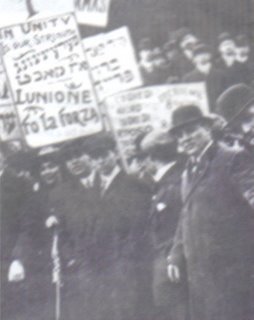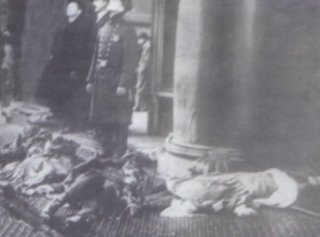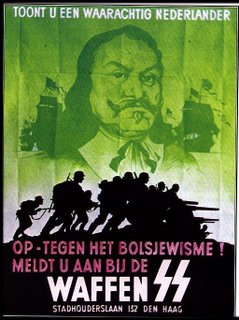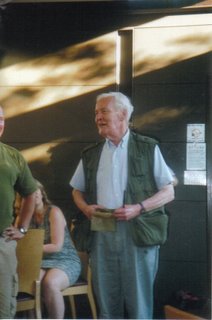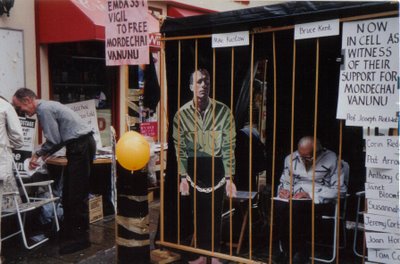Arms of Belgravia

WAFIC SAID
"I'm not an arms dealer!"
with Dennis Thatcher, Rosemary Said, and Baroness T.
THE row over loans to political parties has taken a more serious turn with reports of police interest in both Tory and Labour party finances, and whether they were used to obtain favours, as well as peerages. The Electoral Commission has also asked for details, and questioned whether the loans were made on "commercial" terms.
Meanwhile the Sunday Times has balanced its report on Labour links to an ambitious property developer by bringing an old friend of Tory Baroness Margaret Thatcher back into the limelight. (Cameron took £100,000 from Saudi arms dealer, Robert Winnett and Jonathan Calvert, Sunday Times, March 26).
I'd have thought the "commercial loans" issue is fairly obvious. If a bank or other source of capital lends money to a business it is assuming that it will reap a share of the surplus value produced, in the form of the interest repayments. Indeed a guaranteed profit unless it has really made an ill-advised loan. But political parties, unless you count their bring-and-buy sales and raffles are not likely to become profit-making industries. So what is not obvious is how the loans were ever to be repaid, and if not, what particular advantages -apart from lending as a way to make undisclosed contributions - the lenders could expect to gain.
Hence the issues being belatedly investigated.
In the case of Wafic Said, benefactor of the Tories under David Cameron, the means was different apparently. Said, a Syrian-born Saudi national who denies being an arms dealer, though he profited as a go-between from the massive al Yamamah arms deal, is barred from making political donations in Britain. But before he became a tax exile he did make donations to the Tory party, and since then his Scots-born wife Rosemary has been helping by bidding at fund-raising auctions.
"Last month the Saids bid £100,000 for an eight-person dinner that will be provided by Albert Roux, the chef, at Cameron's first fundraising ball. Nicholas Soames, the former shadow defence minister, and Boris Johnson, current higher education spokesman, were offered as wine waiters.
"Over the past two years the Saids are understood to have given at least £550,000 to the Tories at auctions but none of it has been declared publicly. A friend of Said's said yesterday: 'This is how he continues to support the party, by giving money through auctions.'
"This weekend a spokesman for Cameron said the Tories had complied with the rules and received donations in the name of Said's wife. The party says she is a long-term supporter".
Al Yamamah ("the Dove") was a massive multi-billion-pound deal to sell planes and warships to Saudi Arabia. It was signed by Margaret Thatcher, whose son Mark was said to have received payments for his involvement in the deal in the 1980s. Wafic Said now says his part in the deal was a modest one, compared to that of the Thatchers.
Said, born to a prominent Damascus family in 1939, came to Britain to study in 1960, and became friends with two sons of Saudi Prince Sultan, Khalid (who later commanded Saudi forces during the 1991 Gulf War) and Bandar (now the Saudi ambassador in Washington). In 1969, Said moved to Saudi Arabia and set up a design and construction consulting firm, which obtained big construction and land development contracts during the 1970s oil boom.
His reputation as a negotiator led to him brokering arms purchases for the Saudis, including a $200 million deal in 1979 for the AWACS, American airborne command and control system. In 1981, he received Saudi citizenship. Saudi government arms deals have involved large "commissions" for members of the Saudi royal family. Sharing this with intermediaries across the negotiating table keeps them sweet and stops too much talk about "bribes".
In the 1980s, partly because of alarm raised by the Zionist Lobby in Washington as to how and where Saudi weaponry might be used, Congress started getting restrictive, only for America's arms and aviation industry to watch with chagrin as their British allies stepped into the breach and beat off French competition to secure the deal.
Al-Yamamah, signed in 1986, provided for $31 billion in Saudi purchases of military equipment and services from British Aerospace and other UK military firms over a decade. Since much of the payment was in oil shipments delivered outside the Saudis' official OPEC quota, there are no reliable records of how much was actually paid.
In 1999 a former executive of the arms company BMARC, David Trigger, testified in court that his company paid a 15% commission to Fahd al-Athel, an associate of Saudi Prince Muhammad bin Fahd, to persuade the regime to buy $650 million worth of helicopter weapons. The chairman of Thorn EMI, Sir Colin Southgate, admitted to paying a 25% commission on a $40 million contract for bomb fuses sold under Al-Yamamah.
Some of the money came back into the pockets of individuals in this country. There have been allegations - never proven, but never denied - that Mark Thatcher received £12 million as commission. In 1991, the National Audit Office carried out an inquiry into the Al-Yamamah deal, but its report was suppressed on the eve of the general election by Bob Sheldon, the Labour chairman of the House of Commons Public Accounts Committee, and his Tory deputy. Sheldon admitted that Labour feared being accused of undermining jobs in the aircraft industry.
Alex Sanson, a former British Aerospace marketing director, said in 1998, "You could not do a thing in Saudi unless you went through the Said channel." Said acknowledged helping to broker the deal, but insisted he took no commission. However, part of the deal was for British Aerospace to invest in Saudi Arabia, and he admitted that he "advised British Aerospace in relation to the offset program", later acknowledging "I benefited because the project led to construction in Saudi Arabia that involved my companies." British Aerospace confirmed that Said was paid for "helping this company fulfill its obligations in the Middle East, and Saudi in particular."
A memorandum dated 2nd May 1989, and sent to Labour MP Jeff Rooker, referred to "constant phone calls between Mrs. T and King Fahd and Sir Peter Levene and Prince Sultan. Levene was in fact the person who made the crude oil arrangement... The same source also claims that there is a sizable payment into the Conservative Party...which is being administered by Wafic Said in conjunction with Mark T."
The mystery memo. went on to claim that the Tornado aircraft being supplied were hardened to carry nuclear weapons, at the insistance of King Fahd, and that Saudi officers thought they might carry Pakistani nuclear weapons for use against Israel. A more likely scenario is that the bombers might have been used against Iran. Or this bit about "nuclear hardening" might simply have been invented and slipped into the document by disgruntled US competitors.
Labour MP Rooker, a member of the Commons Public Accounts Comittee, sent a copy of the document to Mrs.Thatcher, who said she had passed it on to "the appropriate authorities", and no more was heard about it. (Lobster magazine, no.26, 1993)
In 1994, reporters ran a land registry search on the home in Eaton Terrace, Belgravia where Mark Thatcher had been living and found it was owned by a Panamanian company, Formigol, registered at the 5th floor of 49 Park Lane - Said's office. In 1998, it was reported that the luxurious Mayfair penthouse of Sir Richard Evans, chief executive of British Aerospace, was registered in the name of another Panamanian company called Knightsbridge Enterprises, which happened to be run from Said's offices at 49 Park Lane.
In 1993, when British Defence Procurement Minister Jonathan Aitken stayed at the Ritz Hotel in Paris at the expense of a top aide to Prince Muhammad, Said Muhammad Ayas, Said's presence at the hotel attracted reporters' notice. Aitken resigned in 1995. Said owned a 30% share in Aitken Hume, a merchant bank founded by Aitken in the early 1980s.
Though Aitken's memory lapse about who paid his hotel bills was to lead to a prison term, Said became a minor celebrity on the Tory scene. He was photographed with Margaret Thatcher and family, and was one of eight guests to sit at her table during a 1987 banquet in Dallas. Politicians and businessmen joined shooting parties at his 3,000-acre country estate in Oxfordshire (which he bought the year after the Al-Yamamah deal). He has homes in Britain, France and Spain, but his Belgravia home is company-owned, which is handy for tax purposes.
Being close to the Thatchers has not prevented ties with the Blair government of course. When the Wafic Said Business School for which he had put up £20 million, overcoming Oxford University's academic reserve, ran into planning objections, the government cleared the obstacles. A leaked October 1998 memo from planning official Avis Gerry to Planning Minister Nick Raynsford noted "we were under pressure from the Prime Minister's office not to delay the decision."
Thatcher foreign policy aide Sir Charles Powell was among Said's friends, and became a business associate. Powell's brother Jonathan became Tony Blair's chief of staff. English Heritage, which had wanted to preserve the old Victorian railway station at Oxford, dropped its objections to the business school building site. Weeks later, Said donated $40,000 to English Heritage.
Said has also been involved in British links with Syria, where he has investments in telecomms and hotels. While the Bush administration and its Israeli allies may like to denounce the Syrian regime and accuse it of supporting terrorism, British strategy has been to keep Syria on board for the invasion of Iraq, as well as for business prospects.
Early in 2001 Peter Mandelson flew to Damascus and met with new president Bashir al-Assad. During the visit, he also attended a party held by Said. Mandelson claimed that the trip was a private vacation to view "ancient ruins," but he had the approval of Blair and the Foreign Office. Later in the year, Said reportedly helped fund a visit to Syria by a parliamentary delegation headed by Labour MP John Austin. In July, Said and Powell joined Syrian Foreign Minister Farouk al-Shara in addressing a conference at London's Dorchester Hotel, entitled "Syria: A New Dawn for Business, Trade and Investment".
In September 2001, Powell was summoned to an urgent meeting with Blair, who asked him to fly to Syria and persuade Assad to agree to meet with him. He flew to Damascus the next day. A little over a month later, Blair became the first British prime minister ever to visit Damascus.
US policy makers probably have mixed feelings about Wafic Said. Some don't like him for helping Arab governments obtain large quantities of arms. Others resent the fact that the arms were bought from Britain instead of the United States.
Labels: Saudi
